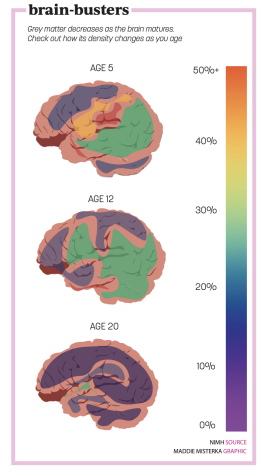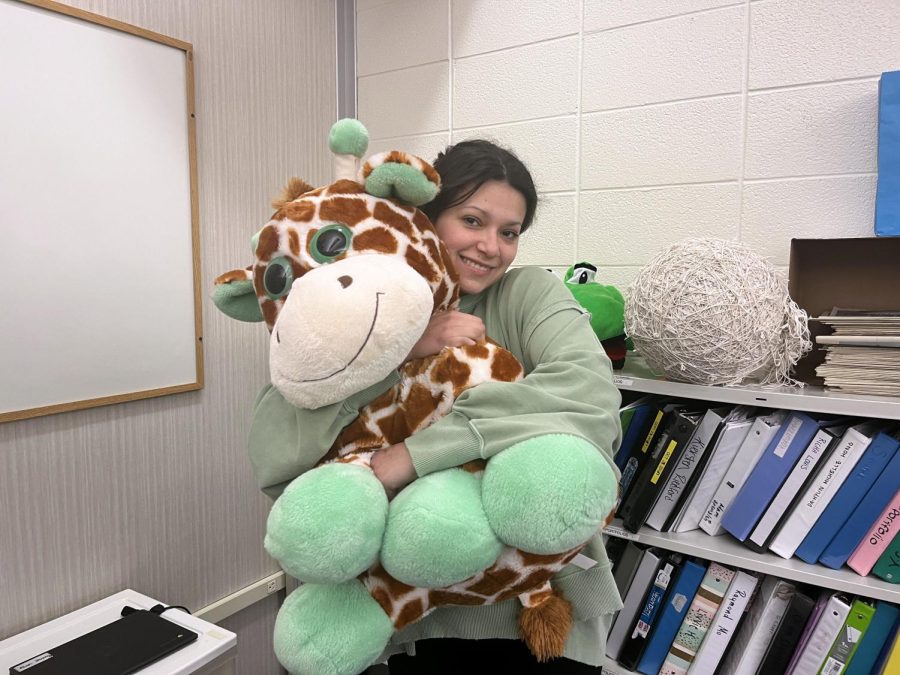Sophomore Ashlyn Higley said students at this school feel pressured to act mature when they are still learning how things work. Higley said that this in part is due to social media.
“I think that recently due to social media, there has been this pressure to look and act more mature than your age,” Higley said. “Our generation spends a lot more time on social media compared to others.”
The numbers back up what Higley claims. According to a Pew Research Center study from August, 56% of teenagers check social media several times a day, but Higley said by having to act more maturely, students lose their “inner child.”
IU psychology teacher Dr. Catherine Borshuk said via email, “The ‘inner child’ is a popular psychology term, sometimes used by therapists, but mostly by self-help writers. It is a metaphor for the childhood experiences that carry into adulthood.”
However, sophomore Yong-Han “Sophia” Chang had a different point of view than Higley on this.
“Someone could still have an inner child and be mature, it’s just the way that they apply their inner child to the nuances of being mature,” Chang said. “For example, delivering an air-tight and effective presentation is arguably the mature thing to do, but given that the curriculum allows you to, pushing your idea in an enthusiastic and fun way is not only an effective way to present your ideas, but it also engages with the audience and encourages them to keep on listening.”
Senior Gloria Sanchez said having an inner child is a good thing.
“Sometimes it is too much to try to do everything at once, and something that I see a lot in families is asking for help as children but as the child grows they become more independent and struggle to ask for help,” Sanchez said. “I think that a big part of that is being able to acknowledge that just like when we were little, we still need help and even if it is something simple as having someone remind you to eat something, it is good to have people looking out for you. That being said, there are points where you may need to be that person for someone else and so always having your inner child present may be detrimental to socializing.”

Chang said she agreed with Sanchez. She said that having an inner child allows her to express her creativity.
“I like to believe that I’m a very evocative person, and I think that because of that, being creative is one of my core values. I believe that creativity allows me to open my mind, and broaden my perspective to find and solve problems.” Chang said. “I think that students can express their inner child by being expressive of the way they feel about things. I think that being expressive can really change the way you look at things.”
Similarly, Higley emphasized the importance of the inner child.
“I think having an inner child is a great way to visualize the needs that were not met when you were a child and can be beneficial to start the healing process. Acknowledging these needs that were not met may even help you identify what needs are necessary to you now from your loved one’s.” Higley said. “However, I think having one is both good and bad. Having an inner child means you most likely had to grow up faster than most other kids but it also allows you to explore those experiences you didn’t get to have as a child.”
Sophomore Eesha Singh echoed Higley’s viewpoint.
“I think that it is really important to have that inner child in your life, especially as a student. In school, we can take on a lot of stress, and having that inner child can really help with that. Within reason, we should carry that quality on throughout the rest of our lives. Another thing that an inner child can help with is that innocence that children have and that they are able to ignore bigger things going on in the world,” Singh said. “A lot of times we get carried away in the biases that we already have and that is something that should not happen.”
Sophomore Ella Ondrejko says that the reason this is a problem is because people feel a pressure to be perfect.
“In elementary school, I was always told that I would have to be perfect at everything. As you get older, that pressure and expectations become greater. Overtime, I also started to raise my standards and felt like I had to be super smart, or do a lot of extracurriculars,” She said, “This causes us to lose the ability to be able to act childlike.”
Singh shares this perspective. She said it is in part due to your upbringing as well.
“My parents always wanted me to be perfect, have a 4.0 GPA, and just always be the best at everything. I even felt this in my childhood, and have continued to feel it through out my life.
But despite the benefit, Sanchez said expressing a person’s inner child is generally looked down upon in today’s society.
“However, if we take the time to reflect a little bit, I’m sure that everyone will notice traits that are a little more childlike. By nurturing your inner child, you are taking the time to recognize past events that may have an effect on who you are today and giving yourself the tools to move forward,” she said.
Likewise, Chang said that expressing your inner child can help you look at the world in a different light.
“Looking at things in a new light could help find and solve a lot of real-world problems that we have right now; every single business out there is trying to fix a problem for customers, and those with the solutions to the best problems thrive. I think that, in this case, the effort isn’t going into finding a solution, but more of finding an issue in the first place,” she said.
Still, Borshuk said that the term “inner child” actually means something different in psychology terms. She also said overall, she wasn’t sure if having an inner child was important.
“We are all the sum of all life experiences, from infancy through childhood and adolescence. The inner child is not really a thing, it’s simply a metaphor that some people, but not many psychologists, use to refer to unresolved childhood issues. For therapists who work with trauma disorders, for instance with clients who were abused as children, it can become a way to acknowledge that abuse and to move toward healing.”































![British royalty are American celebrities [opinion]](https://hilite.org/wp-content/uploads/2024/03/Screenshot-2024-03-24-1.44.57-PM.png)




















![Review: “The Iron Claw” cannot get enough praise [MUSE]](https://hilite.org/wp-content/uploads/2024/04/unnamed.png)
![Review: “The Bear” sets an unbelievably high bar for future comedy shows [MUSE]](https://hilite.org/wp-content/uploads/2024/03/unnamed.png)
![Review: “Mysterious Lotus Casebook” is an amazing historical Chinese drama [MUSE]](https://hilite.org/wp-content/uploads/2024/03/0.webp)
![Thea Bendaly on her Instagram-run crochet shop [Biz Buzz]](https://hilite.org/wp-content/uploads/2024/03/IMG_0165-1200x838.jpg)
![Review: Sally Rooney’s “Normal People,” is the best book to read when you are in a time of change [MUSE]](https://hilite.org/wp-content/uploads/2024/03/20047217-low_res-normal-people.webp)
![Review in Print: Maripaz Villar brings a delightfully unique style to the world of WEBTOON [MUSE]](https://hilite.org/wp-content/uploads/2023/12/maripazcover-1200x960.jpg)
![Review: “The Sword of Kaigen” is a masterpiece [MUSE]](https://hilite.org/wp-content/uploads/2023/11/Screenshot-2023-11-26-201051.png)
![Review: Gateron Oil Kings, great linear switches, okay price [MUSE]](https://hilite.org/wp-content/uploads/2023/11/Screenshot-2023-11-26-200553.png)
![Review: “A Haunting in Venice” is a significant improvement from other Agatha Christie adaptations [MUSE]](https://hilite.org/wp-content/uploads/2023/11/e7ee2938a6d422669771bce6d8088521.jpg)
![Review: A Thanksgiving story from elementary school, still just as interesting [MUSE]](https://hilite.org/wp-content/uploads/2023/11/Screenshot-2023-11-26-195514-987x1200.png)
![Review: When I Fly Towards You, cute, uplifting youth drama [MUSE]](https://hilite.org/wp-content/uploads/2023/09/When-I-Fly-Towards-You-Chinese-drama.png)
![Postcards from Muse: Hawaii Travel Diary [MUSE]](https://hilite.org/wp-content/uploads/2023/09/My-project-1-1200x1200.jpg)
![Review: Ladybug & Cat Noir: The Movie, departure from original show [MUSE]](https://hilite.org/wp-content/uploads/2023/09/Ladybug__Cat_Noir_-_The_Movie_poster.jpg)
![Review in Print: Hidden Love is the cute, uplifting drama everyone needs [MUSE]](https://hilite.org/wp-content/uploads/2023/09/hiddenlovecover-e1693597208225-1030x1200.png)
![Review in Print: Heartstopper is the heartwarming queer romance we all need [MUSE]](https://hilite.org/wp-content/uploads/2023/08/museheartstoppercover-1200x654.png)























![Review: Ladybug & Cat Noir: The Movie, departure from original show [MUSE]](https://hilite.org/wp-content/uploads/2023/09/Ladybug__Cat_Noir_-_The_Movie_poster-221x300.jpg)

![Review: Next in Fashion season two survives changes, becomes a valuable pop culture artifact [MUSE]](https://hilite.org/wp-content/uploads/2023/03/Screen-Shot-2023-03-09-at-11.05.05-AM-300x214.png)
![Review: Is The Stormlight Archive worth it? [MUSE]](https://hilite.org/wp-content/uploads/2023/10/unnamed-1-184x300.png)




